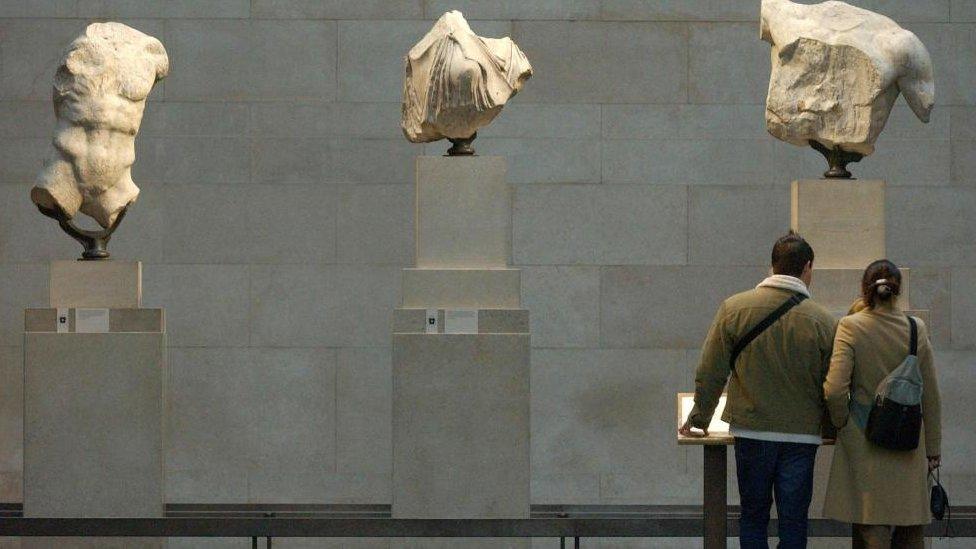Reluctant statesman Rishi Sunak turns focus to foreign affairs
- Published
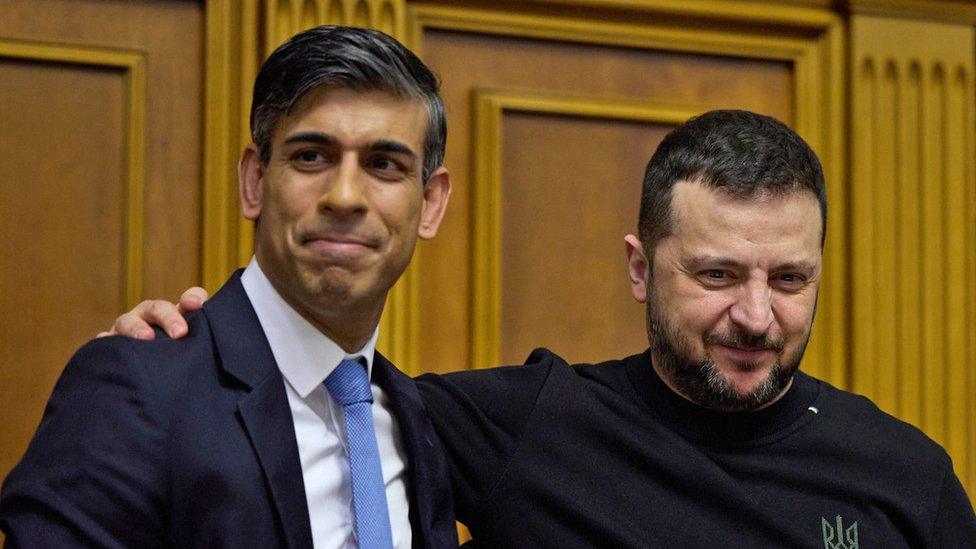
Rishi Sunak's priorities on entering office were domestic, but he has become increasingly engaged in events in Ukraine and the Middle East
When Rishi Sunak entered 10 Downing Street in October 2022, he had little experience in foreign affairs. His priorities were largely domestic: to try to repair the UK economy after the Covid pandemic and revive the Conservative Party's electoral fortunes.
Yet in recent days the prime minister has asserted himself on the global stage more emphatically than many might have expected.
He has gone to war against the Houthis in Yemen, the only European leader to send armed force to join the United States-led air strikes.
He has put Britain at the forefront of the pro-Ukraine alliance, promising increased military support and signing a new security pact with Kyiv, all while US and European Union allies hesitate amid division and fatigue.
I travelled with Mr Sunak on his recent trip to Kyiv and saw first-hand how the prime minister handled both the Red Sea and Ukraine crises at the same time. And what struck me was how far Mr Sunak has had to come in the 15 months he has been in office, from reluctant statesman to engaged international actor.
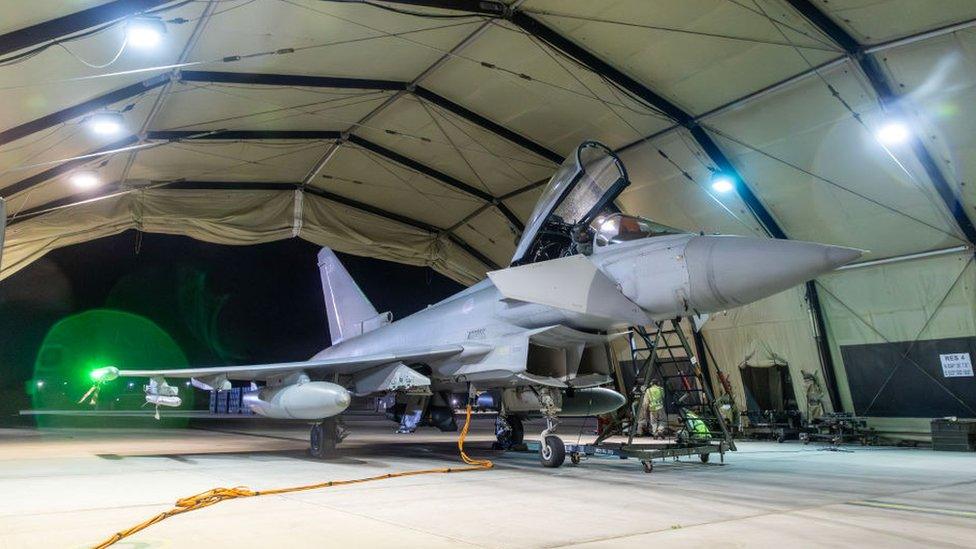
Mr Sunak was the only European leader to join the US in going to war against Yemen's Houthi rebels
When the prime minister replaced Liz Truss, his foreign policy appeared limited to promising continued support for Ukraine. Calling President Macron of France "a friend" was seen as a bold act compared to his predecessor's hesitation. Mr Sunak's five priorities were mostly domestic: the only foreign consideration was stopping boats of migrants crossing the English Channel.
As his first year in office progressed, the prime minister showed at times what seemed like introspective instincts. He fluttered diplomatic feathers by ordering a corporate-style audit of UK military support for Ukraine.
At the G20 summit in New Delhi, he seemed more focused on national matters - fostering a UK-India trade deal, talking to EU partners about his migration policy.
Mr Sunak chose not to attend the United Nations General Assembly in New York. I spent much time there being asked by diplomats why the new prime minister stayed away, missing an opportunity to meet many world leaders.
In November, the PM snubbed his Greek counterpart, cancelling a meeting at short notice after Kyriakos Mitsotakis demanded the return of the Parthenon Marbles during a BBC interview.
And while Mr Sunak has chosen so far not to visit Germany's Chancellor Olaf Scholz in Berlin, he has attended a conference of right-wing parties in Italy.
The view in Whitehall was that Mr Sunak was uninterested in foreign affairs, more engaged on electoral and economic priorities. This impression was confirmed to many by the appointment of Lord Cameron as foreign secretary. Diplomats and officials interpreted this as Mr Sunak outsourcing foreign affairs to a more experienced predecessor.
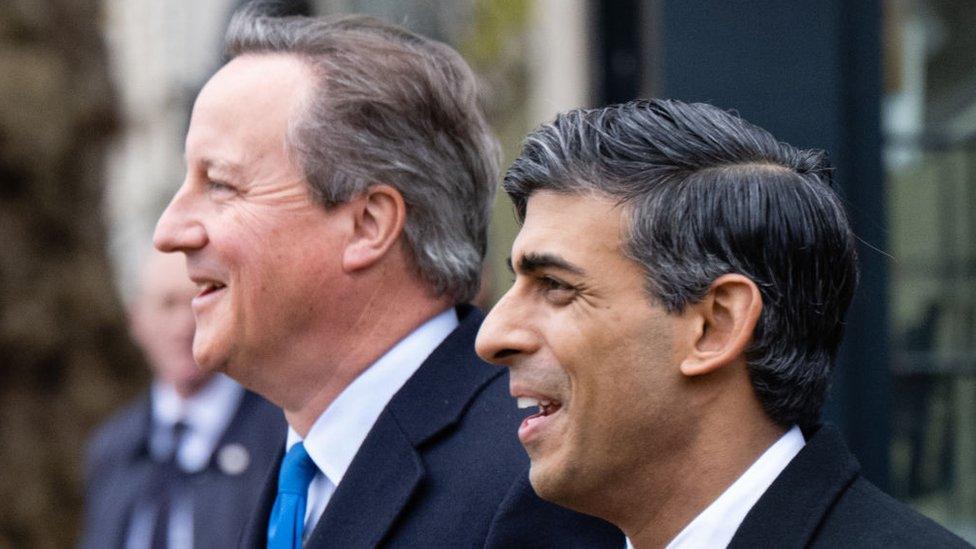
Whitehall insiders saw Lord Cameron's appointment as Mr Sunak outsourcing foreign policy to his more experienced colleague
The prime minister all but confirmed this impression at the Liaison Committee, external before Christmas. Asked by one MP if he considered himself a leader on the world stage, he wriggled visibly with discomfort. "I think others will make that determination," he said.
Yet only a few weeks later Mr Sunak has put British servicemen and women in harm's way, making choices other European heads of government have avoided. So what has changed?
One answer is that he had no choice but to respond to global events. As he admitted to the Liaison Committee: "The increasingly complex and hostile international environment is something that, over the past year, has occupied more of my time than one might have anticipated."
A second answer is that he was always ready to be proactive on the world stage, just in a different way.
Take Ukraine. Where Boris Johnson was an instinctive supporter of Kyiv, Mr Sunak is more rational, talking about "investing" in European security. "The difference is that the PM is pragmatic, as opposed to Johnson who was philosophically all-in," one senior defence source told me.
Mr Sunak's advisers say that when he engages with foreign policy in detail and reaches a conclusion, he can be as hawkish as Mr Johnson, if not more so. They say he has a greater risk appetite than some imagine.
They point to his early support for Ukraine getting tanks and long-range missiles, not fearing the threat of Russian escalation. And in the Red Sea, they note his readiness to deploy RAF warplanes when many European allies - such as the French and Italians - demurred.
That said, Mr Sunak's domestic instincts can still stay his hand. Whitehall sources say serious consideration was given to promising Ukraine a multi-year package of military support - not just one year - to send a clear signal of UK strategic patience to Moscow.
But those sources say Mr Sunak became all "chancellorish" and saw the issue through the prism of Treasury rules. There were discussions about whether part of the money could be promised for some years, a technical solution that muddied waters and was dropped.
A third pointer to Mr Sunak's increased global activism is simply time. The longer prime ministers are in office, the more they find foreign affairs unavoidable and at times alluring, compared to the messy compromises of home.
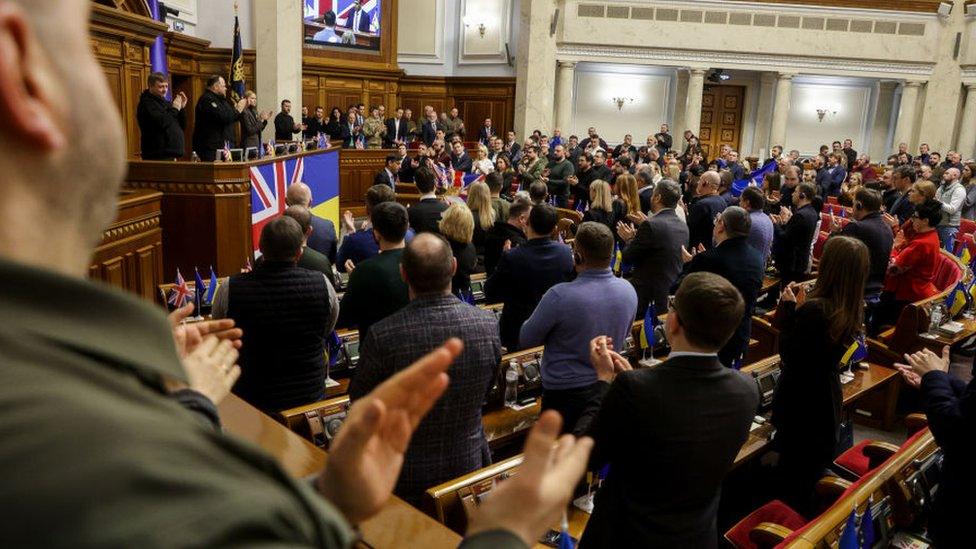
Ukraine's Parliament gave Mr Sunak a standing ovation as he promised more military aid
This was apparent when Mr Sunak addressed Ukraine's parliament, an emotional event where MPs bellowed their national anthem, held a minute's silence for the dead and cheered the leader of a major ally - the first to visit this year - who was showing them some love after months of what they see as growing Western indifference.
"I come from the world's oldest parliament to address the world's bravest," Mr Sunak told them. For a man seen by some as a rational technocrat, he was clearly affected by the emotion. And for a prime minister behind in the polls, repeated standing ovations from any audience are not to be sniffed at.
Rishi Sunak has not suddenly become some global interventionist, seeking to reshape the world in Britain's interests. But nor too is he as unengaged in foreign affairs as some would have it. He may not be prime minister beyond an election later this year. But until then, there will be no shortage of foreign policy and the decisions he makes will matter.
Related topics
- Published12 January 2024
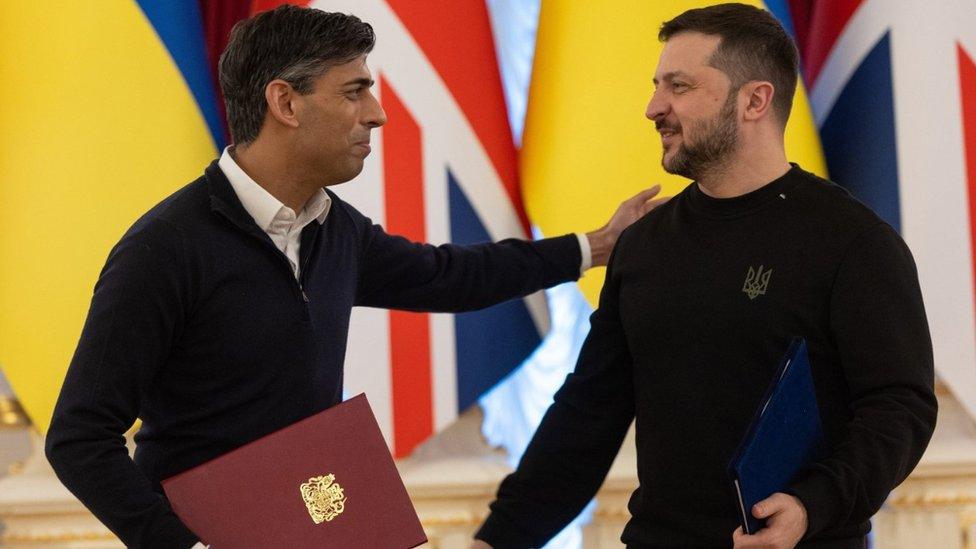
- Published12 January 2024

- Published28 November 2023
